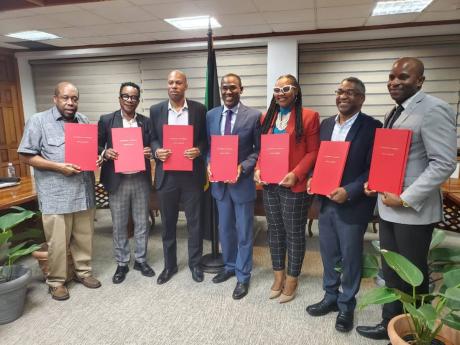Government, unions finally seal public sector compensation deal
After protracted and sometimes contentious negotiations between the Jamaica Confederation of Trade Unions (JCTU) and the Ministry of Finance and the Public Service on the compensation restructuring exercise, both parties on Thursday inked an agreement which now brings closure to several sticking points that have stalled the deal since last year.
St Patrice Ennis, president of the JCTU, told The Gleaner yesterday that outgoing Finance Minister Dr Nigel Clarke led the negotiating team from the government side and signed the agreement along with the member unions of the JCTU.
“We managed to eke out an agreement which I believe most people will not have an issue with because it has been very protracted,” Ennis said of the lengthy negotiations.
Regarding the payment of increments, an item for which there was sharp disagreement between the unions and the Government, the parties managed to strike a compromise.
Ennis said the Government’s position was that the increments would have been absorbed into the compensation scheme, a position that received much pushback from the unions.
The unions were also insisting that the increment be paid retroactively from 2022 when payments on this benefit had ceased.
Increments are paid to public sector workers on the basis of their performance or through the acquisition of additional qualifications.
However, Ennis said under the terms of the agreement, the eligibility criteria have been waived to allow all public sector workers to receive increments.
He indicated that temporary workers and contract workers who were previously not paid increments would now be eligible to receive the benefit.
He said the payment of increments will take effect in March 2025.
NEW OVERTIME POLICY
At the same time, Ennis said a new overtime policy has been introduced which will take effect on August 1, 2024.
He said previously, overtime done by public sector employees had been calculated on their old salary.
With this agreement, all overtime will now be calculated on the current salary of public sector workers.
“One thing we are going to have for everybody and that is time-and-a-half after a 40-hour workweek. First rest day, time-and-a-half, second rest day, double, for everybody,” Ennis told The Gleaner, insisting that this will be implemented across the entire public sector.
He said persons who work beyond the 40-hour workweek from grades one to 10 in the public sector will be paid overtime.
Other items agreed on by the unions and the Government include retroactive payments on passenger and general mileage, a uniform policy that will see improvement in allowances for tailoring and subsistence allowance for employees who leave the office for six or more hours or travel more than 25 kilometres to carry out their duties.
At Thursday’s signing, it was also agreed that the unions should submit their claims by November this year ahead of the new negotiating period that takes effect in April next year.

